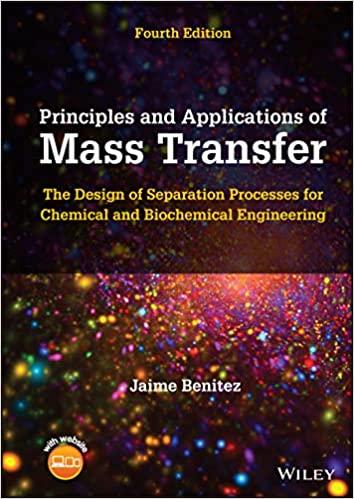A batch distillation column with four theoretical stages (first stage is the still pot) is charged with
Question:
A batch distillation column with four theoretical stages (first stage is the still pot) is charged with \(100 \mathrm{kmol}\) of a \(50 \mathrm{~mol} \%\) benzene in toluene mixture at atmospheric pressure. At a constant reflux ratio \(R=1.5\), how many mol of the charge must be distilled if an average product composition of \(84 \mathrm{~mol} \%\) benzene is required? If the boil-up rate is \(15 \mathrm{kmol} / \mathrm{h}\), calculate the distillation time. The equilibrium distribution curve at the column pressure is given in Example 6.4.
Data From Example 6.4:-
A trayed tower operating at 1 atm is to be designed to continuously distill 200 kmol/h (55.6 mol/s) of a binary mixture of 60 mol% benzene, 40 mol% toluene. A liquid distillate and a liquid bottoms product of 95 mol% and 5 mol% benzene, respectively, are to be produced. Before entering the column, the feed—originally at 298 K—is flash-vaporized at 1 atm to produce an equimolal vapor–liquid mixture (VF/F = LF/F = 0.5). A reflux ratio 30% above the minimum is specified. Calculate:
(a) quantity of the products;
(b) minimum number of theoretical stages, Nmin;
(c) minimum reflux ratio;
(d) number of equilibrium stages and the optimal location of the feed stage for the reflux ratio specified; and
(e) thermal load of the condenser, reboiler, and feed preheater.
Step by Step Answer:






